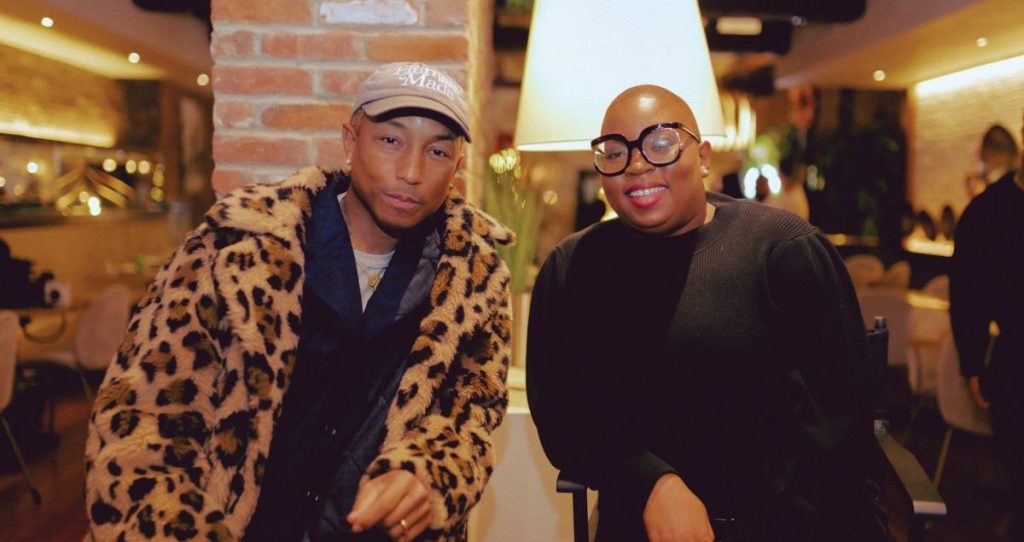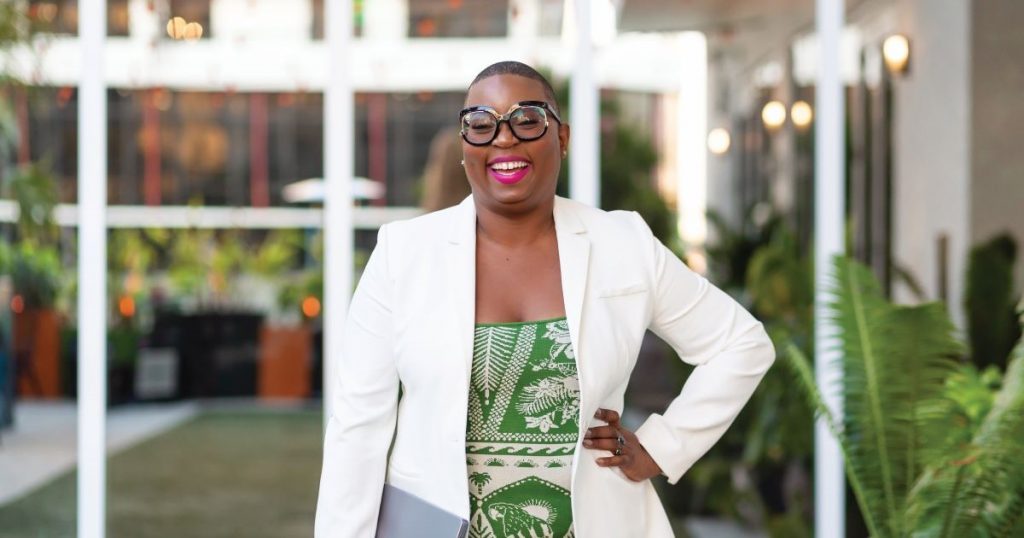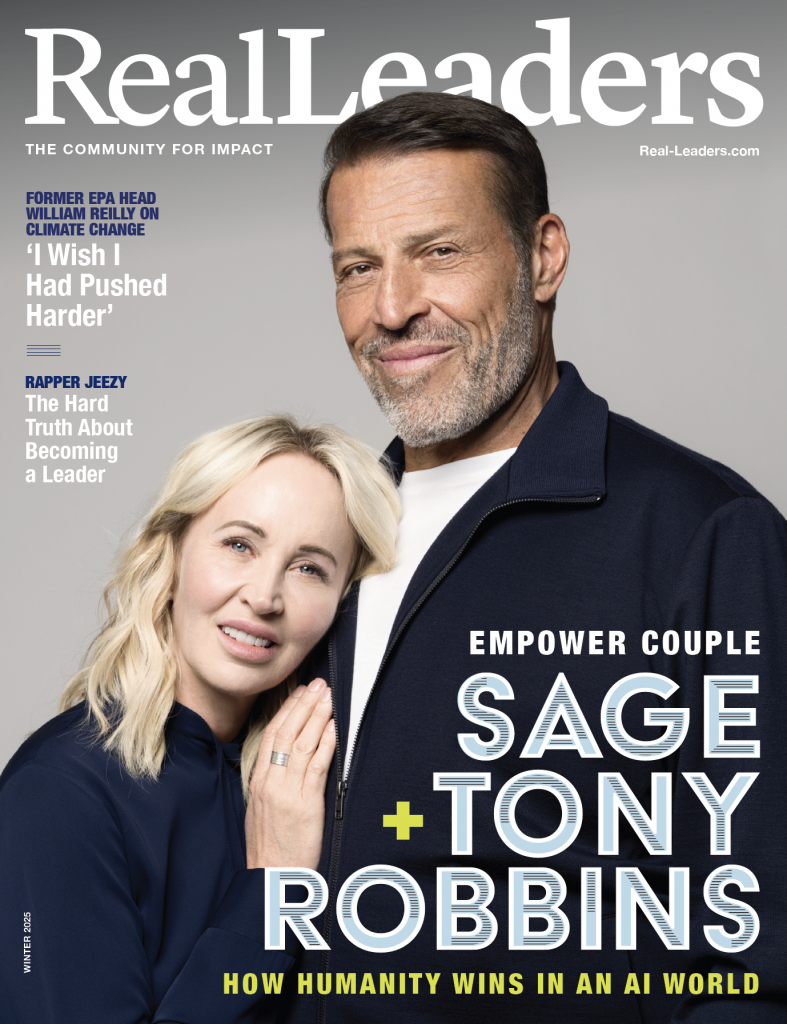Pharrell Williams is closing the opportunity gap for entrepreneurs of color.
By Real Leaders
Pharrell Williams knows music. One of the most influential musical artists and producers in hip-hop, R&B, and pop, Williams has created chart-topping hits for household names, earning 13 Grammy Awards and six Billboard Music Awards. (Cue the mega-hit song Happy.)
Then there are his latest accomplishments in fashion design (Louis Vuitton’s men’s creative director), film production (Hidden Figures co-producer), and several other companies the serial entrepreneur helped found or collaborate with. But what’s music to Williams’ ears lately is not his own success as much as helping others succeed. He is determined to help Black and Hispanic entrepreneurs propel their startups through his budding nonprofit, Black Ambition.
Williams emphasizes that ambition is limitless, but access is not. Even today, Black and Hispanic founders in the U.S. receive less than 3% of all venture capital allocated. That’s why he is investing capital and resources into Black and Hispanic high-growth startups, working to close the opportunity and wealth gap for entrepreneurs who have historically been left out of traditional investment funnels.
“We can do and be anything we want to,” Williams tells Real Leaders. “We just need the support, we need the resources, and we need the tutelage and the guidance.”
Founded in 2020, Black Ambition wrapped up its third annual awards program in November. To date, the nonprofit has given out nearly $10 million to over 100 Black and Hispanic founders through a general prize track and a track for historically Black colleges and universities (HBCUs). Black Ambition has supported an additional 500-plus entrepreneurs with mentorship to strengthen their ventures. To say that Williams is happy with Black Ambition’s impact would be an understatement.
“You gotta pinch yourself because man, this is really happening,” Williams says. “These people are real. The dream is coming true.”
Black Ambition does not only give prize money. As critical as those funds are, the organization also provides other support to set up entrepreneurs for continued success. Semifinalists participate in several months of programming that includes mentorship, resources, community, and networks. Williams feels that he is answering a calling.
“I’ve learned from the mistakes that I’ve made, and I realized how much I paid dearly for it,” Williams says. “And I realize how many good things I’ve done and how they affect things in a much more exponential way. When you see all the parallels and all the patterns, you start to realize there’s this overarching goal of doing good and doing well. It’s a karma credit score. I’m just paying my tithes to the universe, not only leaving the door open, but doing my absolute best to share the codes in the most universal way possible.”
Anti-Systematic Gravity
At its core, Williams defines Black Ambition as anti-systemic gravity, a push to help Black and Hispanic startups gain momentum despite the challenges. It’s a need he witnessed first-hand growing up in the projects in Virginia Beach.
“As a child, I don’t know that I ever had ambitions to be an entrepreneur,” he says. “I had never heard of the word, and I didn’t grow up in a community that had that kind of mentality. Entrepreneurship was not something that we understood to be within the realm of possibility, and there was a hundred million percent no Black Ambition as a construct.”
He continues, “There were lots of Black-owned companies in Virginia Beach and Norfolk. They just would never celebrate it the way we celebrate it now. You didn’t hear about the person who owns the tire company or the landscaping business and was totally crushing it or the person who owns a swath of gas stations. The way that we herald it now is amazing, but we should have been doing that all along. Gravity pulls our race down, and we don’t even know it. Disproportionate access to health care, education, and representation — that’s a gravitational force that pulls down on marginalized people more so than it does for our White siblings.”
Williams considers himself fortunate to have been able to break through this gravitational pull. Born to a handyman and a teacher, the college dropout turned to music to cope with neighborhood shootings and hardships. “Music was one of the greatest distractions,” he says. “The music got us by.”
His career kicked off when he was discovered at a high school talent show by music industry veteran Teddy Riley. Williams later partnered with a friend to establish the production company The Neptunes, promoting and selling the work of pop, hip-hop, and R&B artists, as well as forming an R&B group with the same name.
“When I got into the music industry, eventually I realized, OK, you’re going to be your own publisher, so that’s a business,” he says. “As a musician, you’re making music, so you are making a product, and that product has to be managed. You are going to be known for the person who is supplying this product. The instruments that you use are what help you create or conjure this music. So, you start thinking entrepreneurially just by being a musician.”
Williams produced explosive hits for Jay-Z, Beyonce, Britney Spears, Nelly, Gwen Stefani, Madonna, Jennifer Lopez, Ed Sheeran, and other household names, and while the music side came naturally to him, some of the business side did not.
“The first 10 years, I made so many terrible investments, but I didn’t have anyone around to vet these opportunities and tell me, ‘OK, this is worth your time, this is worth your space,’ and most importantly, ‘this is also worth your financial investment,’” Williams says. He is ensuring that Black Ambition fills that role for entrepreneurs today.
“This is My Purpose”
Williams and his team are forging a way for Black and Hispanic entrepreneurs to “build uninterrupted.” It’s a phrase he uses often within Black Ambition.
“Building uninterrupted means that there is no historical and-or systemic gravity on your concept, that it is able to free float, and exist, and build on its own,” he says. “You’re uninhibited by any kind of gravitational force.”

To help create those opportunities, Williams put Felecia Hatcher at the helm of Black Ambition. As CEO, Hatcher has helped entrepreneurs connect to over $100 million in funding over the past eight years, earning honors from the Obama White House, Harvard, and Comcast, to name a few. She is an author, speaker, business owner, and co-founder of the Black Tech Week conference and The Center for Black Innovation. “Black Ambition is lucky to have her, but so are all of these entrepreneurial minds,” Williams says. “I always look to her. You listen to her speak, and you feel like you can do anything.” (Read Real Leaders’ Q&A with Hatcher.)
Black Ambition also has formed several strong partnerships with leading brands and organizations including Adidas, the Lennar Foundation, the Chan Zuckerberg Initiative, the Visa Foundation, Heineken, and Chanel. Plus, the nonprofit offers its awardees bi-weekly office hours with proven leaders in marketing, public relations, and brand building with Heineken, Snapchat, Netflix, and others.
“You need as many incredibly well-educated, well-experienced eyes around you at all times, and they should be better than you because if they aren’t better than you, then you’re never going to be better than what you are,” Williams says. “When you get a handful of them around you, wow, you’re about to be lifted.”
Winning recipients attend town hall meetings with Williams and receive life coaching and therapeutic workshops in groups and one-on-one, setting up a holistic career approach.
“It takes a village,” Williams says. “You just need the right people. You need the right energy — and that energy is curiosity, it is ambition, and it is the desire to see the person next to you do well. It is a devotion and a diligence with respectful reciprocation.”
As for fielding the prize applicants, Black Ambition looks for unique and innovative businesses to propel, primarily in the fields of technology and consumer products and services, but also in health care, media and entertainment, and Web 3.0.
“The purpose of a business should be based on its necessity,” Williams says. “It should exist because we need it and we don’t have it. Or if we already have it, it’s because this is the superior version and this is going to change the game. Other than that, it’s just fodder. We don’t need another edition of the same. We need something that is going to level us up.”
In 2023, Black Ambition introduced the So Ambitious HBCU Tour in partnership with Techstars and Thurgood Marshall College Fund. The tour brings entrepreneurial training to historically Black colleges and universities to create new wealth pathways and opportunities for undergraduate and graduate entrepreneurs. Students create real companies with the help of mentors, investors, and experienced entrepreneurs and the support of incubator and accelerator programs, business pitch competitions, boot camps, and access to capital. The tour is targeting Alabama, Florida, Virginia, Louisiana, Maryland, Texas, Georgia, and Washington, D.C.
“It looks so promising,” Williams says. “You see the support we’re getting, the kinds of partnerships we’re forming, and the people who are getting involved, the really creative Black and Brown ideas that are coming in — it’s really inspiring.”
A man of faith, Williams feels divinely aligned with his work for Black Ambition. “I believe that this is my purpose,” Williams says. “I believe that I’m supposed to share the codes, and I believe that there needs to be this organization that helps to share the codes by doing some funding and also really serious strategic advice and mentorship.”
Williams points out the need for Black Ambition to be amplified. “I see a future with Black Ambition chapters or offices all over the world because the Black and Brown diaspora isn’t just in America,” he says. “No matter what position we play in this world, we need to know that we can be anything, and that is the ultimate Black Ambition.”

Removing Barriers, Accelerating Success
Black Ambition CEO Felecia Hatcher gets real about the challenges of Black and Hispanic startups.
Real Leaders: What is Black Ambition, and what are you as an organization set out to accomplish?
Felicia Hatcher: Pharrell was the ultimate visionary creating Black Ambition, and when you think about vision, you also think about how expansive vision can be when it’s tied to legacy. So, I think of all the amazing things that he has done and has yet to do. The entrepreneurs impacted by his vision will be a part of his greatest legacy because those are the ripple effects.
We have 100 entrepreneurs that we’ve invested in up until this point at the three-year mark. A lot of organizations that do similar work have only dreamed of impacting as many entrepreneurs as fast as we can. We understand the premise that not only are we trying to close the wealth gap, but wealth has a need for speed — and a lot of people have gotten really, really comfortable wasting the time of Black and Hispanic entrepreneurs. We know that time is infinitely more valuable than money. So, once they waste that money, waste that time, they cannot get it back.
So, with Black Ambition, we do a few things. One, we’re getting them the resources faster, we’re getting them the money faster, so that they can go out into the marketplace, make decisions, hire people faster, and have a faster impact upon their communities while building really good companies. I think of all the success that the founders have had. We’ll reach the point where we’ve invested just about $10 million into these companies in 2023. They’ve gone on to raise over $92 million in the past three years with all the entrepreneurs that we interface with, and that’s no small feat when you look at the number of less than 3% of all companies actually receiving venture capital investment are Black and Hispanic.
What keeps me up at night is, if this initiative was never founded, these brilliant companies would not have been able to have the impact that they’ve had as well as the ripple and network effect. There are just so many people who stand in the way of this greatness being able to happen, which is the problem that we’re fighting every single day.
RL: What have been some of Black Ambition’s biggest challenges so far?
Hatcher: There are a lot of challenges when you’re building a program that also spans quite broadly in whom we serve — not just early entrepreneurs who are a little bit more seasoned, but then we also fund and support HBCU students. Pharrell and I feel that HBCUs are some of the most fertile but untapped grounds for talent, but that also comes with a level of additional support that’s needed sometimes because they’re very young entrepreneurs who haven’t done significant time in corporate and then decided to leave corporate America and launch a startup, which is what we see oftentimes with our early-stage startups. We make sure that they have the soft skills, support, and training that they need as well as mentorship and programmatic support so they can be globally competitive with what they’re building. We also teach them to be very good stewards of the relationships that often come from Pharrell.
In the business world, everything is a relationship game, whether you like it or not. Being able to be good stewards of those relationships, especially when you’re building a program at scale, is something that we are very careful with, and then really trying to instill that in the entrepreneurs we’re introducing them to, which he has cultivated over the years and we’ve cultivated as an organization.
The other part is funding for the organization. A lot of organizations that made very big commitments in 2020 have walked them back in a moment when we need additional capital. Funding for Black entrepreneurs and startup founders specifically is down 45% in the last year. In a time where the economic climate is a little shaky, those entrepreneurs need capital even more. Having great, strong institutional partners that have been with Black Ambition from the beginning is critical, but then we also have to navigate that day to day to make sure we’re building a sustainable organization that can continue to fund those entrepreneurs at the level in they need and which we’ve deemed to be catalytic for those entrepreneurs. It’s definitely a challenge we navigate every single day.
RL: What does Black Ambition look for in its applicants?
Hatcher: We look at their risk tolerance, how they’re able to navigate crises and change, and their ability to lead as a whole — so what makes them a great leader that not only will allow them to build teams but also to leverage Black Ambition’s initial investment to bring on additional investors. We also look at a level of resource magnetism: Do they have it? Can they attract the resources, people, and buy-in that they need to continue to build a thriving startup in their communities?
Then, we look at the usual stuff — product market fit, the market potential as a whole, the viability of being able to scale and be very good stewards of the resources.
Ultimately, what we’ve been building with Black Ambition with Pharrell’s vision is like a rocket ship for these entrepreneurs. Not every entrepreneur is ready to move and scale as fast as they think they are, so we’re also looking at some characteristics that represent that they can get on the rocket ship that all entrepreneurs hope for and then be able to take it, do something with it, and then ultimately be massive contributors back into the Black Ambition community.
RL: Is impact a common thread among Black Ambition’s winning companies?
Hatcher: When you look across our portfolio of entrepreneurs that we’ve invested in, they’re all for-profit companies, but they have the heart and soul of social impact entrepreneurs. They’re all building something much bigger than themselves with some sort of direct impact back to their communities. It’s an unstated thing that we look for in our selection process.
Community X is one of the companies that immediately comes top of mind because they built a platform that allows people to quickly sign petitions and make donations for big moments that require a lot of capital and advocacy to happen. They were our 2022 Black Ambition Prize winner. Then we have quite a few other companies solving some big problems, whether it’s in the reproductive health space for women, feminine hygiene products, or our 2021 Black Ambition Prize winner, Logistics, who is a construction software management company in the green tech space. So we are seeing these companies not just solving and getting into high-growth areas, but then also monetizing with an impact back into the community.
Support Black Ambition
Black Ambition is a nonprofit initiative launched by Pharrell Williams in 2020 that provides Black, Latino, and HBCU-affiliated entrepreneurs with prize money, high-quality mentorship, and connections to diverse entrepreneurial and investor networks and resources. Learn more at blackambitionprize.com.
Meet the 2023 Black Ambition Winners
Selected from 2,000-plus applicants, over 250 semi-finalists participated in the 2023 Black Ambitionist Mentor Program, a 12-week entrepreneurial curriculum. The top 36 finalists each received a minimum of $20,000 in prize awards, totaling $3.2 million. The final eight pitched live on stage to compete for the $1-million grand prize at Black Ambition’s third annual Demo Day in November 2023. Expert IEP, a parent-facing app that optimizes existing Individualized Education Plans with predictive AI for children diagnosed with a disability, won the $1-million grand prize; ECOMSPACES, a one-stop-shop for e-commerce solutions ranging from product photography to order fulfillment, earned the $250,000 top prize; and Monocle, a social e-reader that creates a community-focused reading experience, received the $200,000 HBCU grand prize.





